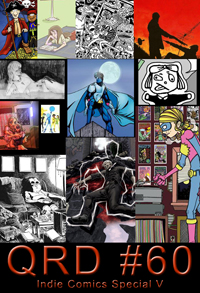
 |
| about
this issue Indie Comic Creator Interviews: Mike Dawson Floyd Lewis A.P. Fuchs Darin Shuler Trevor Denham Jules Rivera John Steventon Lorenzo Ross John Allison Michael San Giacomo Matt Chic Jackie Crofts Don W. Seven Derek Baxter Interview Series Updates: Nate McDonough Jason Dube Brian John Mitchell |
 |
 |
 |
 |
 |
 |
|
|
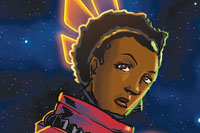 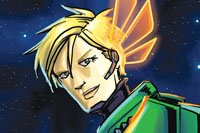 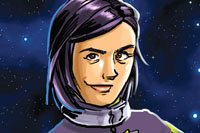 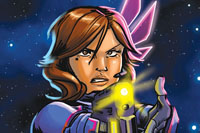 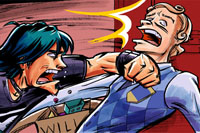           |
April 2013
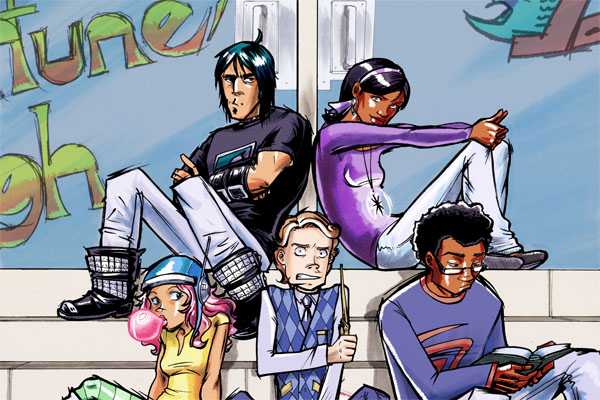
City: Los Angeles
Comics: Valkyrie Squadron, Misfortune High
Websites: www.valkyriesquadron.com, www.misfortunehigh.com
QRD – How old were you when you first got into comics & did you always stick with them or did you come back to them?
Jules – I always had an interest in sequential stories, but I think it all gelled when I was 14. I never stopped reading comics after that.
QRD – What was the first comic book you ever bought?
Jules – There were many given to me as a child, but I think the first comic I ever bought for myself was TokyoPop magazine back when it was called Mixxzine.
QRD – How old were you when you put out your first comic?
Jules – 23 I think?
QRD – What decade do you think produced the best comics?
Jules – Every decade is capable of producing gems & crap alike. It’s easy to say “creativity got stifled when...” but that’s not true. Indy comics have always been around to pick up the mainstream’s slack, so it’s impossible for me to say when the best comics were around because there are always great comics out there.
QRD – Why comics instead of just writing or drawing?
Jules – Because I’m a masochist.
QRD – Do you see mini-comics & indie comics as paths to mainstream comics or as their own unique media?
Jules – Comics are comics. It doesn’t matter who published them. Indy comics are no different than “mainstream” comics other than pipelines & marketing. Ultimately, it’s all about a guy with a pen drawing out a story frame by frame.
QRD – How many copies of your comic do you print in your first run?
Jules – I generally do very short runs of less than 100 just to test the waters.
QRD – How much do you think comics should cost?
Jules – However much the market’s willing to pay so that the creator doesn’t get totally screwed.
QRD – How many books do you produce a year & how many would you like to?
Jules – I’d like to put out 3 or 4 books a year, but I mainly hammer out 2 these days, as I’m a one-man-band.
QRD – Do you think stories should be serialized or delivered as complete works?
Jules – It really depends on the story & what the creator’s intentions are. Some stories work better as graphic novels, others work better as floppies.
QRD – How are comic strips different than comic books & which medium do you prefer?
Jules – It’s easy to say, “strips are a gag-a-day thing & comics are long form”, but I’ve found that’s not totally true. Some strips can tell long form stories just as well as some comics can tell one-shot jokes. Really, it’s a formatting thing in which one seems to be landscape format vs. portrait, but 4-panel koma comics punch a nice hole in that theory. I prefer to work in what you’d call “comic books” because the page itself is never standalone. Everything I do is done with the intention of eventually putting it into a book.
QRD – How long is it from when you start a comic until it’s printed?
Jules – Roughly 6-8 months, but then my issues are longer than the standard 22 pages.
QRD – What do you do better with your comics now than when you first started?
Jules – Just about everything. I didn’t know what I was doing when I first started.
QRD – Do you do thumbnails?
Jules – Any artist worth their salt better do thumbnails. Otherwise, that’s a prime recipe for layout & framing mistakes.
QRD – At what size do you draw?
Jules – 11” x 17”. I always draw in excessively huge sizes so I don’t have print resolution issues down the road. Always easier to scale down than scale up.
QRD – What kind of pens do you use?
Jules – Copic Multiliner pens for man-made objects, Tombow Fudenosuke & Pilot Brush pens for more organic objects like characters & trees & stuff.
QRD – What does your workstation look like?
Jules – Like a tornado hit it.
QRD – At what point in the artistic process do you work digitally?
Jules – Pretty much from the word “go” because if I bork up pencils or layouts it’s a way easier fix digitally. However, that doesn’t mean my process is 100% digital. I mostly like to do my inks on boards (I invested in a large format printer) because there’s a certain unpredictability only natural inks can capture. A digital program can be a little too controlled if you want to let loose.
QRD – What do you think of digital comics & webcomics?
Jules – They’re pretty great.
QRD – Do you prefer working in color or black & white?
Jules – Every artist has to understand values, but I’ve built my reputation as a full color guru.
QRD – How many different people should work on a comic & what should their jobs be?
Jules – Who am I to tell someone else how their pipeline should be? I know my pipeline usually consists of only me or me & a writer, but however anyone else does their comics is their business. I’d like to say it’s good to have a separate artist & writer but then I’ve seen some writer/artists put out amazing stuff single-handedly, so what do I know?
QRD – How do you find collaborators?
Jules – They tend to find me. I’m rather vocal on Twitter & Tumblr.
QRD – How tight do you think a script should be as far as telling the artist what to draw?
Jules – As an artist, I’m not a huge fan of writers who are control freaks, mainly because they’re not the ones in the trenches solving the problems of drawing out the story. What a writer thinks sounds like a good idea may not translate well to a page at all. I’ve even done this mistake writing my own stuff, where Jules the Writer comes up with an idea that Jules the Artist straight up shoots down. Writing is a totally different mentality than art. I’m usually cool with breaking a page into panels with a quick description, but if a writer comes at me with a whole essay describing each panel, I will not likely stick around for the project. I am the artist. I am the dude who translates the words to pretty pictures. Let me do my job.
QRD – What comic book person would you be most flattered to be compared to?
Jules – I’d rather just be paid like a big wig than just be compared to one.
QRD – What do your friends & family think of your comics?
Jules – It depends. My family still doesn’t quite get the whole thing, but they’re fairly accepting of it. My friends are the ones who genuinely get excited about my work.
QRD – What do you think of superheroes?
Jules – They kind of need to stop taking themselves so seriously. They are the original men in tights. Make it fun, not dysfunctional.
QRD – Marvel or DC?
Jules – Whoever’s willing to try new stuff. & I don’t mean “New 52” or “Marvel Now,” but I mean genuinely fresh material. Most popular superheroes have been around since before I was born. How about we work with different kinds of stories? Or like a fun superhero story for once? You hang around long enough, you get to see the same stuff over & over & it gets old.
QRD – What comic characters other than your own would you like to work with?
Jules – Hmmm, interesting question. I like to work with characters that are fun & appeal to an all-ages group (it’s my brand, yo). One of my favorite IPs I worked on was Princeless from Action Lab. I did a short story & a couple of covers for them last year. Their stuff is a lot of fun.
QRD – Ideally would you self-publish?
Jules – Might as well since I’ve been doing it for seven years.
QRD – What conventions do you try to attend & why?
Jules – I like to attend Southern California conventions because I don’t have to travel far.
QRD – What do you do to promote your books?
Jules – Not enough. I shout about my books a bit on Twitter, Facebook, & Tumblr, & I take out the occasional internet ad. Otherwise, I’m usually too busy making the stuff to promote it. I’m still learning the balance of what’s good promotion versus good content output.
QRD – Do you think your comics are well suited to comic shops or would sell better elsewhere?
Jules – In a perfect world, all kinds of comics would be welcome in comic shops, but we don’t live in that perfect world. My focus is all-ages books whose leads are women & minorities & generally comic shops tend to gravitate to something a bit more “traditional.”
QRD – What other medium would you like to see some of your comics made into (television, film, games, action figures, etc.)?
Jules – If my comics ever got turned into animations, that would be so amazing. Also statuettes are pretty cool too.
QRD – Do you consider yourself a comic collector or a comic reader or both?
Jules – I’m a reader. Anyone who collects comics just to have their numbers is missing the point of sequential storytelling.
QRD – What do you see as the most viable mediums for comics distribution 10 years from now?
Jules – Digital.
QRD – What would you like to see more people doing with comics?
Jules – READING THEM. Comic readership, especially here in the US, is pretty dismal. We can all do better to spread the word to our fellow non-comic reader. I’m doing my part to make stories that don’t straight up alienate certain readers (which certain publishers have a surprisingly hard time doing). We can all do our part by just giving comics to kids & relatives.
QRD – Anything else?
Jules – I wish more artists would research how to draw breasts. The comic market has too many badly drawn boobs & this makes me sad. Life drawing classes people. They are your friend.
